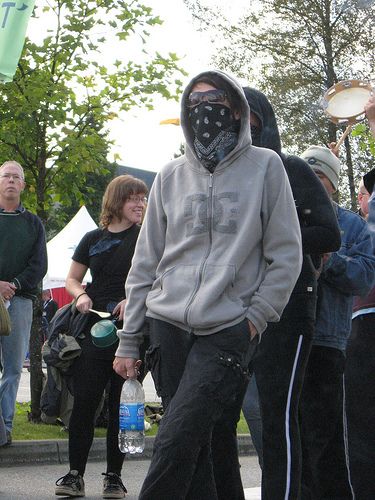Protesters seen as likeliest disruption
Protesters seen as likeliest disruption
The Olympic secretariat's official business plan envisions an environment ripe for demonstrations. Several activist groups hope to make its projections reality
ROD MICKLEBURGH AND STEVEN CHASE
Globe and Mail, February 26, 2009
VANCOUVER AND OTTAWA -- Of the many potential problems that might bedevil the 2010 Winter Olympics, from terrorist attacks to cost overruns to natural disasters, the one that looms largest for federal Olympic officials is the threat of local protesters.
"Major events are a certain target for activist groups to protest at, and the 2010 Winter Olympics are no exception," the federal Olympic secretariat says in its official business plan for the Games, a copy of which was obtained by The Globe and Mail.
The plan assessed 16 individual risks to the Olympics and rated disruptions by protesters as the most likely to occur.
"Political, environmental and other advocacy groups may see the 2010 Winter Games as an international stage for which to promote their cause," the secretariat's business plan said, adding that such actions could have a negative impact on public interest in the Olympics.
Anti-Olympic activists said yesterday the government is right: They do plan to cause problems.
"We will do whatever we can to disrupt the 2010 Olympic Winter Games in whatever way we can," vowed Anna Hunter of the Anti-Poverty Coalition, a member of the Olympic Resistance Network.
"Simple protests about the impact of the Olympic Games on the poor, the homeless, natives and the environment haven't changed anything. Disruption has proved extremely successful," said Ms. Hunter, pointing to raucous demonstrations that played havoc at earlier Olympic celebrations.
Since anti-Olympic protesters crashed the public unveiling of the Olympic countdown clock two years ago, storming the stage and hurling paint balloons, Vancouver Olympic organizers have refrained from holding public events and kept details of Games-related announcements under wraps until just before they take place.
"We have driven VANOC underground," Ms. Hunter enthused.
Other risks analyzed by Ottawa's business plan included lack of readiness to respond to natural hazards, lack of preparedness to respond to a significant breach of security, insufficient bilingualism, negative public opinion because of excessive federal spending on the Games, and a low medal count by Canadian athletes.
The plan considered protests and public hostility to Olympic funding to be the only two categories with a "high" likelihood of occurring. However, the impact of protest disruptions on the Games was regarded as greater than that of turned-off taxpayers. Adding in the recently announced Olympic security budget, the federal government is on the hook for more than $1.2-billion in Games-related spending.
The business plan suggested that the Olympic secretariat attempt to mitigate the protest risk by maintaining communications with CSIS, the Department of Foreign Affairs and the RCMP, which heads the Games security unit.
The RCMP has promised to consult with anti-Olympic activists to try to arrange a way for them to hold legal demonstrations at the Games. Several prominent activists were approached earlier this month by members of the security unit's Community Relations Group, who said they wanted to open lines of communication.
But Gord Hill of the Olympic Resistance Network said the group wants nothing to do with the RCMP.
"It's an oppressive institution, nothing but a repressive agent of the government," Mr. Hill said. "We expect to see a massive occupation of Vancouver during the Olympics.
"But we intend to be on the streets, spreading the message that the Olympics are not a celebration of sport, but just a commodity. Certainly there will be disruptions. The rich shouldn't just be allowed to carry on."
The Harper government referred The Globe and Mail to the RCMP for comment on the secretariat's business plan. But spokeswoman Dawn Roberts said the Mounties could not speak about the report because they didn't write it.
"In general, when dealing with issues or questions around threats, the RCMP and the Vancouver 2010 Integrated Security Unit monitors and will continue to monitor information and intelligence on a continual basis, from a variety of sources, both domestic and international," Ms. Roberts said.
